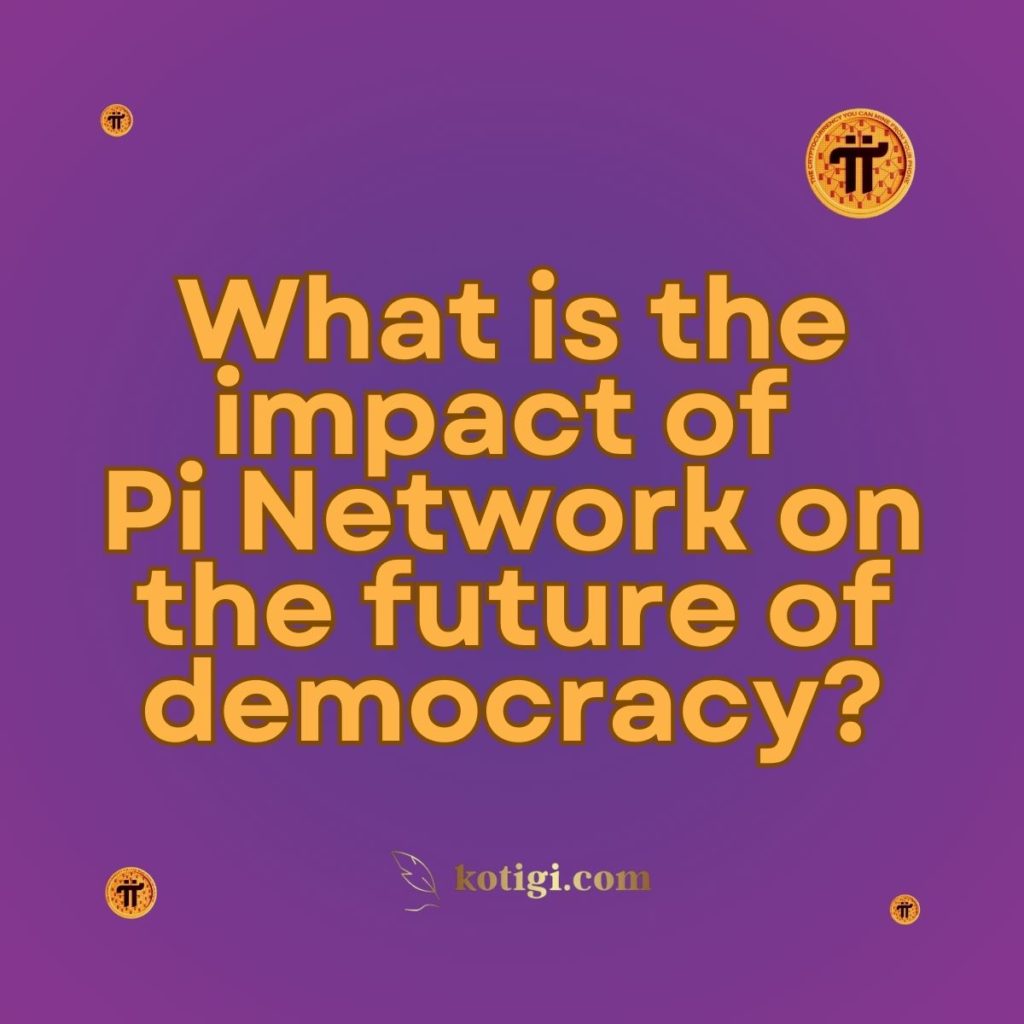
What is the impact of Pi Network on the future of democracy?
Pi Network’s decentralized blockchain technology has the potential to significantly impact the future of democracy by enhancing transparency, promoting voter engagement, securing election integrity, and fostering direct citizen participation. This article explores how Pi Network can revolutionize democratic systems and strengthen the relationship between governments and citizens.
Introduction
Democracies around the world face numerous challenges, including voter apathy, electoral fraud, lack of transparency, and centralized power structures. Blockchain technology, particularly through decentralized platforms like Pi Network, offers solutions to these issues by enhancing transparency, securing elections, and fostering greater citizen involvement in governance. With Pi Network, democracy could evolve into a more decentralized, participatory, and transparent system where citizens have direct influence over policy decisions and governance. This article examines the potential impact of Pi Network on the future of democracy and how it could help shape more inclusive and accountable democratic institutions.
Enhancing Election Integrity
One of the primary ways Pi Network could revolutionize democracy is by ensuring the integrity of elections. Blockchain technology can provide secure, transparent, and immutable records of votes, making elections fairer and more reliable.
Securing Voting Records with Blockchain
In traditional voting systems, ballots are susceptible to tampering, manipulation, and fraud. Pi Network can provide a secure blockchain-based voting platform where every vote is recorded immutably, ensuring that once a vote is cast, it cannot be altered or deleted. This prevents electoral fraud and enhances the credibility of election results, allowing citizens to trust the outcome.
Reducing Electoral Manipulation
Blockchain’s decentralized nature makes it difficult for any single entity to manipulate election results. In a system powered by Pi Network, votes are distributed across a decentralized network, which prevents centralized authorities from tampering with or controlling the election process. This reduces the risk of vote rigging, manipulation, and unfair practices that often undermine democratic elections.
Enabling Remote Voting
With Pi Network, citizens can cast their votes from anywhere in the world using a secure, blockchain-based platform. This capability could significantly increase voter participation, particularly among citizens who are unable to vote in person due to travel, health, or logistical reasons. Remote voting on a secure blockchain would also reduce the cost and logistical complexity of running elections.
Increasing Transparency in Governance
Transparency is a cornerstone of democratic governance, and Pi Network’s blockchain can provide the tools necessary to ensure that governments are more open and accountable to their citizens.
Publicly Accessible Decision-Making Records
Governments often face accusations of secrecy, corruption, and backroom deals. Pi Network’s decentralized blockchain can record and publicly display decisions made by government officials, allowing citizens to monitor how policies are created and implemented. This transparency ensures that elected officials are held accountable for their actions, fostering greater public trust in democratic institutions.
Transparent Political Campaign Financing
Political campaign financing is another area prone to corruption and influence from special interest groups. By using Pi Network’s blockchain, political donations and campaign spending can be recorded and made publicly accessible in real time. This allows citizens to see who is funding political candidates and ensures that all campaign contributions are transparent and verifiable, reducing the influence of dark money in politics.
Monitoring Government Spending
Citizens can use Pi Network’s blockchain to track how public funds are being spent. This ensures that government budgets are used as intended and prevents the misuse of taxpayer money. By making financial records publicly accessible, Pi Network promotes greater accountability in public spending and ensures that funds are allocated in a fair and transparent manner.
Promoting Direct Citizen Participation
Pi Network can foster new models of direct democracy, where citizens have more opportunities to participate in decision-making processes, vote on policies, and propose laws.
Blockchain-Based Voting Platforms
One of the most promising applications of Pi Network in democracy is the creation of blockchain-based voting platforms. These platforms would allow citizens to vote on laws, policies, and public projects directly, without needing to go through elected representatives. Smart contracts on the Pi Network blockchain could automatically execute the outcomes of these votes, enabling a more direct form of democracy where citizens have a greater say in governance.
Citizen-Led Policy Proposals
Pi Network can also empower citizens to propose and vote on policies directly. Blockchain-based governance platforms would allow individuals to submit policy proposals, which could then be voted on by the wider community. This form of participatory democracy ensures that government policies reflect the will of the people and that citizens are actively engaged in shaping the future of their communities.
Decentralized Governance Models
Pi Network supports decentralized governance models, such as Decentralized Autonomous Organizations (DAOs), where communities can govern themselves without centralized authorities. These DAOs can be used to manage local projects, allocate resources, and make decisions collectively, giving citizens more control over their own governance. This decentralized approach to democracy reduces the concentration of power and fosters a more inclusive and participatory political system.
Strengthening Civic Engagement
Civic engagement is critical for the health of any democracy, and Pi Network can enhance citizen participation by making it easier for individuals to engage with their governments and communities.
Incentivizing Participation with Pi Coins
Pi Network’s ecosystem allows users to earn Pi coins for participating in governance-related activities, such as voting, submitting policy proposals, or volunteering in community initiatives. This incentive system encourages more citizens to become actively involved in the democratic process, ensuring that a wider range of voices is heard in decision-making.
Engaging Youth in the Democratic Process
Young people are often underrepresented in traditional democratic processes. Pi Network’s user-friendly, mobile-based platform can engage younger generations by providing them with tools to participate in decision-making and governance directly from their smartphones. By making democracy more accessible to younger citizens, Pi Network can help foster a more politically active and informed generation.
Creating a Global Civic Network
Pi Network can also enable global civic engagement by connecting citizens across borders through decentralized platforms. This would allow individuals from different countries to collaborate on global issues, share best practices, and advocate for change on a global scale. The creation of a global civic network would promote greater cooperation between citizens and governments worldwide, strengthening democratic governance on a global level.
Reducing the Influence of Centralized Power
Centralized power structures are often a source of corruption and inefficiency in democratic systems. Pi Network can help decentralize power by distributing decision-making authority among citizens and reducing the influence of centralized authorities.
Reducing the Power of Political Elites
In many democracies, political elites hold disproportionate power and influence over government decisions. Pi Network’s decentralized governance models can reduce the influence of these elites by giving citizens more direct control over policy decisions. Blockchain-based platforms allow for more equitable participation, ensuring that decisions are made collectively rather than by a small group of powerful individuals.
Decentralizing Public Resources
Pi Network’s blockchain can also decentralize the management of public resources, such as budgets, social services, and infrastructure projects. Communities can use blockchain to allocate resources more efficiently, ensuring that public goods are distributed fairly and based on the needs of the people rather than political favoritism.
Empowering Local Governance
Pi Network supports decentralized, local governance models where communities can make decisions independently of national governments. Local governments can use Pi Network’s blockchain to manage resources, conduct elections, and create policies that reflect the specific needs of their communities. This decentralization of governance fosters greater local accountability and responsiveness.
Conclusion
Pi Network’s decentralized blockchain technology has the potential to reshape the future of democracy by enhancing election integrity, promoting transparency, fostering direct citizen participation, and reducing the concentration of power in centralized institutions. By providing secure voting systems, public accountability tools, and decentralized governance models, Pi Network can help build more transparent, inclusive, and participatory democratic systems that better serve the needs of citizens. As the world embraces digital transformation, Pi Network could be a key driver in creating a more democratic, decentralized, and transparent future.
Key Takeaways
- Election Integrity: Pi Network’s blockchain can secure voting systems, prevent tampering, and ensure transparent election results.
- Government Transparency: Blockchain technology provides a public ledger for government decisions, political financing, and public spending, enhancing accountability.
- Direct Citizen Participation: Pi Network fosters new models of direct democracy, allowing citizens to vote on policies and submit proposals through decentralized platforms.
- Civic Engagement: Incentivized participation and blockchain-based governance platforms can increase civic engagement and encourage broader participation in the democratic process.
- Decentralized Power: Pi Network reduces the influence of centralized power by distributing decision-making authority among citizens and empowering local governance models.





